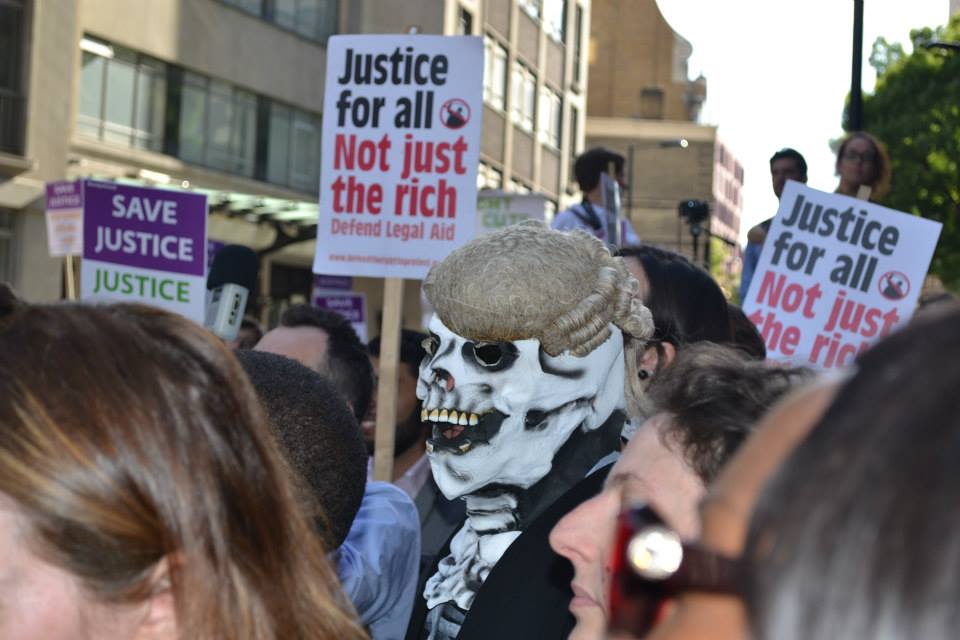MoJ face another challenge to ‘catastrophic’ legal aid cuts for defence firms
The Ministry of Justice (MoJ) faces yet another challenge to its ongoing restrictions on access to justice, after the Law Society last week issued proceedings in its judicial review of reductions to legal aid for criminal defence lawyers to read evidence served by the prosecution.
Following a consultation on the proposals, the MoJ announced in October 2017 that it would reduce the cap on the number of pages of prosecution evidence (PPE) that criminal legal aid lawyers would automatically be paid to read from 10,000 to 6,000. From 1 December 2017 onwards, when the cut came into force, for time spent considering any evidence exceeding 6,000 pages, lawyers have to submit a claim for ‘special preparation’ in order to be paid for this work. Currently, only 20 per cent of such claims are successful.
The government expects to save between £26m and £36m as a result – money which would otherwise have gone to fund defences for people accused of serious criminal offences and potentially facing lengthy prison sentences. Unsurprisingly, this has not been popular with criminal defence lawyers and access to justice campaigners – indeed, 97 per cent of respondents to the MoJ’s consultation (including Young Legal Aid Lawyers, whose response is here) opposed this plan to further cut criminal legal aid.
At the time of the consultation, a joint position statement by the Law Society, Legal Aid Practitioners Group, Criminal Law Solicitors Association and London Criminal Courts Solicitors Association said the ‘proposals ultimately pose a threat to access to justice, a fundamental right at the heart of the justice system’. The groups argued that ‘a line must be drawn as the profession cannot absorb any more cuts’.
This reduction in the PPE cap is simply the latest example of the ‘death by a thousand cuts’ austerity campaign against criminal legal aid, with each action of the government making the system progressively less sustainable and justice progressively more difficult to obtain.
The timing of this cut has a particularly Kafkaesque quality, given the recent outcry concerning lack of disclosure of key material which undermines the prosecution case. This has led to renewed calls for protections to ensure evidence is disclosed in line with the provisions of the Criminal Procedure Rules: what use is disclosure of evidence if defence teams are not granted the funding required to consider these documents?
It may well be the case that a 2,000 page expert analysis of a defendant’s mobile phone does not contain the key evidence proving the defendant’s innocence, but a defence team will not know this unless they consider the report – to refuse to pay them for this time simply makes it more difficult for defence lawyers to represent their clients thoroughly and further restricts access to justice.
Prior to the MoJ’s U-turn on the proposed implementation of two-tier contacts for criminal legal aid, a February 2013 report by Otterburn Legal Consulting, commissioned by the Law Society and the MoJ, found that firms were achieving an average 5 per cent profit margin in crime work. Further, the report stated that ‘t[h]e finances of many crime firms are fragile. Most do not have significant cash reserves or high excess bank facilities’. This results in firms having only a minimal ability to absorb the implications of legal aid cuts and remain viable businesses.
Should the challenge to the PPE cap reduction be unsuccessful, criminal defence firms will be in the unenviable position of having to decide between either not considering papers in excess of 6,000 pages and therefore being in breach of their duty to act in the best interests of their clients; or considering all papers and accepting the fact that, on average, they will only be paid for this in one out of every five cases.
The profession is already struggling to survive: fixed fees mean that firms must take on higher quantities of cases than they used to. A larger caseload inevitably results in less time being spent on each matter and therefore risks key evidence being missed and miscarriages of justice occurring.
The pre-action letter sent to the Ministry of Justice by Bindmans on behalf of the Law Society in December 2017 set out four grounds of challenge: (1) disproportionate interference with the constitutional right of access to justice; (2) the changes unlawfully frustrate or are inconsistent with the statutory purpose of the litigators graduated fee scheme for criminal legal aid; (3) there were insufficient inquiries and no sufficient regard made to age demographic issues; and (4) the decision is irrational and based on material errors of fact.
The letter argues that the changes will be ‘catastrophic for the legal aid crime firms it affects’, and refers to the successful challenge by Unison to the employment tribunal fees introduced by the Coalition government. In that case, the Supreme Court held that impediments to the constitutional right of access to justice can ‘constitute a serious hindrance even if they do not make access completely impossible’, and any such hindrance or impediment by the executive ‘requires clear authorisation by Parliament’ (i.e. not just by a minister making secondary legislation).
In recent years, the government has been ruled to have acted unlawfully in imposing ‘two tier’ contracts for criminal legal aid, introducing a residence test for civil legal aid, restricting funding for victims of domestic violence and for applications for judicial review, limiting the exceptional case funding scheme, cutting legal aid for prison law and introducing fees for employment tribunal claims.
The newly appointed Secretary of State for Justice, David Gauke, will have to hope that he fares better in the courts than his predecessors, particularly the hapless Chris Grayling. Meanwhile, criminal defence lawyers, the Law Society, Young Legal Aid Lawyers and other access to justice campaigners will be hoping that the judiciary continues to uphold the fundamental constitutional right of access to justice.
This article was first published on January 29, 2018






